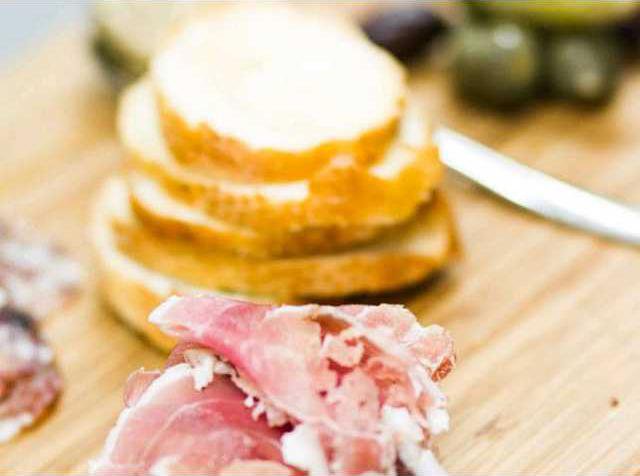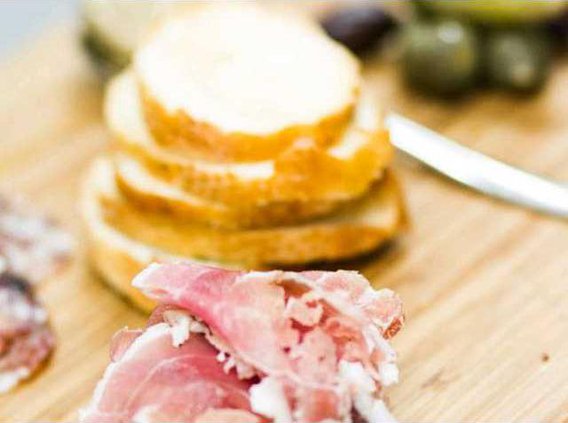What's the difference between a bistro and a brasserie?
When it comes to classical French cooking, most us wouldn't parse the difference — as long as the food is sublime and the service,magnifique.
But among les françaises, there are distinctions:
A bistro is defined as a casual neighborhood joint, serving up rustic fare in a homey atmosphere. Technically, a brasserie is a brewery, though it has come to mean an upscale watering hole with exquisite food and refined décor. Rigorously curated wine and beer lists are de rigueur — as are white tablecloths.
Adherence to this French tradition is the idée fixe of Brasserie 529, tucked away off Liberty Street between Price and East Broad. Elegant sconces and requisite brass flourishes adorn the walls, evoking a certain Parisian ambience. Edith Piaf croons quietly through the speakers as servers dressed in black glide serenely among dark leather banquettes.
Owned and operated by husband-and-wife team John and Amber Roelle, Brasserie 529 celebrated its second anniversary last February and continues to build a loyal following of Savannah foodies. Amber jokes that while the cuisine is the draw, customers also deeply appreciate the large parking lot that eliminates any of the common inconvenience of dining downtown.
Though the recipes are French, most ingredients are sourced closer to home: Produce and seafood come from local purveyors and meats come from family-owned Hunter Cattle.
"We take a farm-to-table approach," says Amber. "Everything from the charcuterie to the ice cream is prepared in house.
"We'll take a whole pig, butcher it down and use every part."
The Roelles met as culinary arts students at Johnson & Wales University in Rhode Island, and after much travel and research, moved to Savannah to open the restaurant of their dreams. Amber handles the front of the house, managing an impeccably-trained staff, while John rules the kitchen, collaborating with Executive Chef Forrest Ison.
The menu changes every season, and though the Roelles incorporate Creole influences into its offerings, Chef John respects the classical French techniques and their regional origins. The catch of the day — perhaps locally-caught grouper or sea bass — is always prepared in the Languedoc style, a Mediterranean-influenced flavor bomb of garlic, olive oil and fresh herbs.
"It's just clean and simple cooking," says John.
While one might pop into a bistro for a quick meal, this brasserie offers opportunity to linger over a long procession of courses. Appetizers whet the palate and reflect the French fondness for organ meat in the pan-fried sweetbreads ($13) and the ambrosial Torchon au Foie Gras, a truffle-infused take on the traditional duck liver served with liquor-poached pears, finely sliced cornichons and other goodies ($12). Buttery frog legs — a staple on French brasserie menus — make seasonal appearances.
Entrees include more French fundamentals like Steak & Gaufrettes ($25) and Hare in Mustard Rosemary Sauce ($20), while a Creole influences sneak in on the andouille sausage-stuffed Chicken Breast ($19.) The tremendously popular Mussels and Turtle in a vegetable fennel cream sauce ($26) is unique to Savannah though venerated in French cuisine. The turtles are of the snapping variety and taste much like a turkey leg — the tentatively adventurous can sample it in a bowl of turtle soup ($8.)
Desserts vary; lucky diners might find a creamy vanilla-lemon mousse served in an espresso demitasse or a lip-smacking berry cobbler topped with housemade fig ice cream. For those willing to hand over their culinary destiny, the chef also offers a five-course tasting table ($65, $85 with wine.)
Of course, French food is incomplete without an accompanying glassdu vin, and each server is well-versed in essential wine pairings. With any seafood dish, try the PicPoul de Pinet, an ample-bodied white somewhere between a Pinot Grigio and a Sauvignon Blanc — quite reasonable at $25 a bottle.
The Roelles are remarkably down-to-earth, welcoming the jeans-and-flip-flops-set as warmly as the jewels-and-sportcoat folks. Even if you wouldn't know a confit from a canapé, all appetites can appreciate the focus on fresh ingredients and drinks to match.
"We have the French flavor, but we're not stuck-up," laughs Amber.

